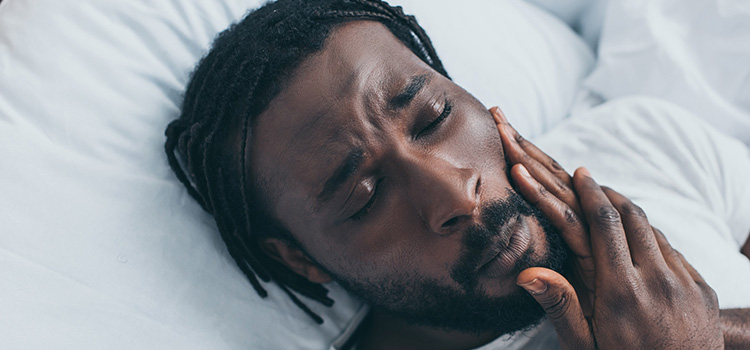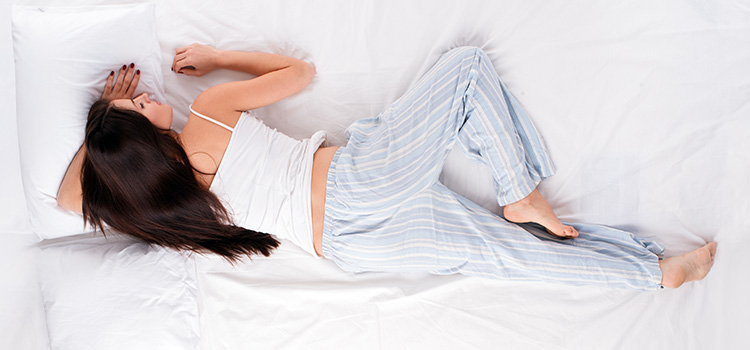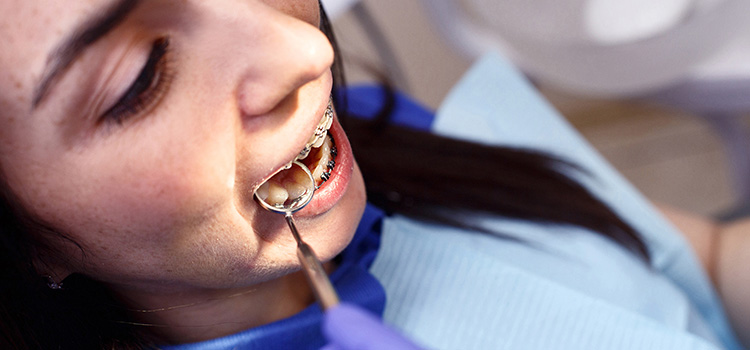Why Do My Teeth Hurt When I Wake Up?
29th Feb 2020

Waking up with painful or sensitive teeth time and time again isn’t normal. To answer the common question “ Why do my teeth hurt when I wake up?”, we should first consider that finding the cause might be difficult, as a number of conditions or situations can cause tooth pain and toothaches. The cause might be as simple as your sleeping position, or more complicated like impacted teeth or bruxism (teeth grinding or clenching). In this article, we’ll go over a wide range of possible causes of morning tooth pain and how you can get help.

Causes of Tooth Pain in the Morning
If your teeth hurt when you wake up, there are many possible causes: teeth grinding, gum disease, congestion, cavities or other tooth damage, TMJ, or even heart disease. Mild tooth pain can usually be treated at home. For intense tooth pain; however, you should visit your dentist as soon as possible for treatment options.
Bruxism (teeth grinding or clenching)
Bruxism is a sleep disorder where you grind or clench your teeth, typically at night. Often, you might not even realize you do it unless you wake up with symptoms, which can include headaches, a sore jaw, and tooth pain. Grinding your teeth, may slowly wear down your tooth enamel, which can lead to increased sensitivity and pain.
If bruxism is the cause of your tooth pain, a night guard can provide relief from your tooth pain. Mouthguards provide a cushion between your upper and lower teeth, protecting them from the wear and damage that bruxism can cause.
Related Articles:
Gum Disease (Periodontal Disease)
Periodontal disease occurs when the tissues surrounding your teeth become infected. Typically, bad brushing and flossing habits allow plaque to build on your teeth, eventually leading to gum disease. When this happens, your gums can become inflamed and tender, and your teeth can even loosen. Even if your teeth don’t become loose, tissue inflammation alone could cause teeth pain.
Your dentist or a specialist called a periodontist can diagnose and treat gum disease. In the meantime, you can take steps at home to help control the disease. Smoking is a major risk factor, so quitting can help your oral hygiene. Speaking of good teeth habits, if you don’t already, brush and floss at least two times per day. Schedule a dentist visit right away if you suspect you have periodontal disease.
Sinus Infection or Congestion
If your tooth pain is in your upper teeth alongside sinus infection symptoms, that could be the cause of your pain. Even if your congestion has not fully evolved into a sinus infection, the pressure your congestion creates can affect your teeth as well. When you have a sinus infection, your sinuses become inflamed and swollen, placing pressure on the surrounding bones and tissue.
To relieve the pressure caused by a sinus infection, try staying well hydrated, breathing in steam from a hot bath or shower, or using a nasal decongestant spray. Over-the-counter pain relievers may also help with the pain. If a sinus infection persists, your doctor might prescribe an antibiotic.

Sleeping Position
While sleeping position might not be the root cause of your tooth pain, your sleeping position can impact the intensity of your tooth pain. When you lie down at night, more blood gathers at your head and increases pressure, which can increase your tooth pain.
If you suspect your sleeping position affects your tooth pain, try elevating your head with pillows. You might also find relief by sleeping with the side that hurts facing up. Even if this makes your toothache feel better, you should still check in with your dentist or doctor. A sleeping position is not typically the sole cause of tooth pain.
Cavity, Cracked, or Abscessed Tooth
Toothache or pain localized to one specific tooth likely has its root cause in that tooth. Common causes in this case include a cavity, a cracked tooth, or an abscessed tooth. Each is explained below:
- Cavities, also known as tooth decay, are tiny holes that open up in your tooth.
- Cracked teeth are exactly what they sound like--cracks in your teeth.
- Abscesses are infections near or inside your teeth.
Once you understand cavities, cracked teeth, and abscessed teeth, it makes sense that they could cause intense tooth pain. Pain from cavities and cracked teeth tends to come and go, while pain from abscessed teeth tends to be constant. Treatments vary for each condition but in extreme cases can include a root canal or tooth extraction. While you wait for a dentist appointment, you can control the pain by avoiding triggers (such as cold, hot, or hard food) and taking over-the-counter pain relievers.
Impacted Tooth
In adults, impacted teeth appear most commonly in the form of wisdom teeth that have not been removed. An impacted tooth gets stuck below the gum line, which typically occurs when your mouth isn’t big enough to accommodate all of your teeth. It can also happen when your tooth develops and attempts to erupt facing the wrong direction.
Your tooth could be stuck in the gum or even in the bone. The impacted tooth is unable to grow and erupt, and this can cause pain either in that tooth or in the surrounding teeth it puts pressure on.
A common remedy for impacted teeth is surgically removing them. According to the American Association of Orthodontists, “Fixing an impacted tooth can range from relatively simple to complicated.” To this end, it is best to have a suspected impacted tooth checked out by a dentist, orthodontist, or oral and maxillofacial surgeon sooner rather than later.
TMJ (Temporomandibular Joint Dysfunction)
TMJ disorders, also known as TMD, refer to a dysfunction of the temporomandibular joint, which connects your jaw to your skull. When this joint doesn’t work properly, it can lead to a variety of symptoms, including soreness of the jaw, jaw pain and tooth pain. Sometimes, TMJ causes the jaw muscles to become overworked, which can lead to tooth pain.
Because the cause of TMJ is unknown, it may be more difficult to completely eliminate the associated tooth pain. If you believe your tooth pain is caused by TMJ, visit your dentist to learn more about the suspected causes of your particular case of TMJ and to seek treatment.
Related Articles:
Teeth Whitening
Teeth whitening is widely known to cause tooth sensitivity that usually subsides once you stop using teeth whitening products. Morning tooth pain is more likely to occur if you use an overnight teeth whitening product. If you sleep with your mouth open, you’ll likely wake up with dry teeth, which can exacerbate your sensitivity caused by tooth whitening.
If teeth whitening is causing your pain, you can choose to stop whitening your teeth, use your teeth whitening product less often, or try a different product.
Heart Attack or Heart Disease
While this is the worst-case scenario, your morning tooth pain could be a sign of heart disease or even a heart attack. Your vagus nerve accounts for the connection between heart trouble and tooth pain — it runs through your heart and your jaw. If your tooth pain is accompanied by chest pain or tightness, shortness of breath, or lightheadedness, call 911 or head to the nearest emergency room immediately as this may indicate a heart attack.
If your dentist cannot determine the cause of your tooth pain, he or she may refer you to a cardiologist.

What to Do When You Experience Tooth Pain
Clearly, tooth pain can have many causes, from something as mild as nasal congestion to something as serious as a heart attack. Regardless of what you suspect is causing your tooth pain, check in with your dentist, and call 911 if you believe it is a medical emergency. It’s always important to get medical advice and see your dentist any time you notice major changes in your mouth. Until you can get some answers, the following remedies help alleviate tooth pain:
- Take over-the-counter pain relievers
- Rinse your mouth with saltwater
- Put cold compresses on the painful area for 20 minutes at a time
How to Prevent Tooth Pain in the Future
Not every cause of tooth pain is preventable, but proper oral health can help reduce your risk of tooth pain. Taking care of your teeth is simple:
- Make sure you brush with a soft toothbrush and toothpaste at least twice per day
- Floss at least once per day (preferably twice)
- Visit your dentist every six months
- Schedule additional check ups any time you have pain or concerns about your dental health
Sources:

- Most Popular
- Hard Outside, Soft Inside
- 2MM Thick
- Moderate / Heavy

- Most Durable
- Hard Materials
- 1.5MM Thick
- Heavy / Severe

- For Day Time Use
- Thin, Barely Visible
- 1MM Thick
- Light / Moderate

- For Clenching
- Flexible & Soft
- 1.5MM Thick
- Light / Moderate

